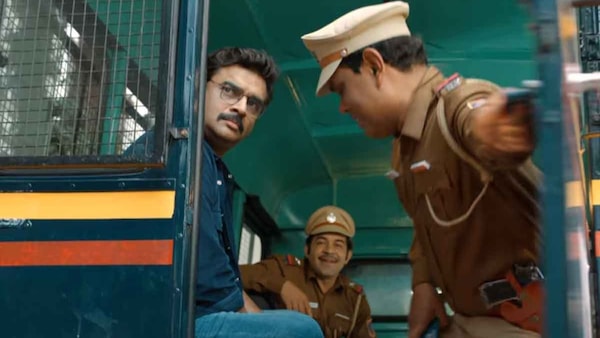Hisaab Barabar Struggles To Balance Its Books Of Impact & Entertainment
Directed and co-written by Ashwani Dhir, Hisaab Barabar gets lost in the woods of poor execution, crass writing choices and a classic case of overcompensating for the lack of conviction.

Promo poster for Hisaab Barabar.
Last Updated: 01.49 PM, Jan 23, 2025
IN A SCENE from Zee5’s Hisaab Barabar, Radhe, a righteous ticket collector, while deposing for financial fraud he has been accused of chooses to sit on a table rather than a chair. The judges are bewildered, for the table carries a decree of honour and dignity to their profession. “But so does a common man,” Radhe argues. The system has encroached on his personal life. Can he not return the favour? At least for as long as he isn’t proven guilty. Such whimsical details populate this otherwise tepid exploration of a good man’s crusade for justice. Not because there is greatness in him, but because he doesn’t know any other way around the world. Some people are just cursed to be earnest. Hisaab Barabar isn’t the wildest swing away from your usual underdog story, but it is, courtesy of a credible Madhavan performance, colourful enough to earn the tag of watchability.
Madhavan plays Radhe, a middle-aged, single father who daylights as a ticket collector and moonlights as a borderline obnoxious keeper of financial registers. Radhe is obsessed with numbers. So much so he doesn’t even believe in rounding them off. Precision is the centrepiece of his otherwise dull life. He even views the sugar in his kitchen through the weight-price symbiotic relationship. A 27 rupee discrepancy in his bank statement drives him to the comically named ‘Do Bank’; a literal moniker for a money-guzzling cesspool of negligence and corruption. People are bemused by his predicament — and that is hardly a predicament. But Radhe’s notorious habits won’t let him be. Driven by this OCD he decides to dive deeper and uncovers, a scam big enough to potentially run a small Indian state. The only problem is, that nobody cares.

On the other side of Radhe’s hapless mission, is the loudmouthed, exuberant man-child Mickey Mehta, played by Neil Nitin Mukesh. The embodiment of what cronyism looks like when you don’t have time to furnish a deeper, more authentic character analysis. Mehta is suave, spectacularly overdressed and rarely pauses for effect. He dances with his housemaids, randomly slaps his guards, and exacts violence by video-calling his mercenaries and watching the results on a giant TV. Mukesh is tasked with hurriedly becoming the worst person on the planet, and while the script leaves much to be desired, he manages to pull it off — just about. He is, after all, the insufferable fall guy in waiting.
Directed and co-written by Ashwani Dhir, Hisaab Barabar is what you get when a promising script meets the immovable loss of objectivity. There is potential here to at least put together a whimsical, slice-of-life story about the grumpiness of a middle-aged, lonely man, becoming the vehicle for institutional change and yet this film gets lost in the woods of poor execution, crass writing choices and a classic case of overcompensating for the lack of conviction. Everyone from the bank manager, to a friend who courts Radhe for help with accounting, buttresses the non-existent tension with innuendos and hollow punchlines. To add insult to injury, Radhe’s charming but underwhelming flirtations with a woman (Kirti Kulhari) feel abjectly placed to fill a space, as opposed to an interconnected block of life, feeding meaning to the future. A bizarre, and wholly unnecessary twist makes Kulhari’s character central to Radhe’s toils with the system. It's a sure sign of a story that knows its agenda but not its world.

In between the mess though, there is this clear, crystalline presence of Madhavan, who comfortably squeezes himself into the soft suit of a father, a dogged employee of the government, a part-time crusader and an all-round nerd who just eats and excretes in numbers. Radhe is all about ‘hisaab’, not as a matter of violence, but as the sole method that keeps madness from entering his relatively simple life. He bemoans people’s lack of empathy, as opposed to their lack of motivation. Everyone wants cronies behind bars, but nobody has the time to unpick the lock and open the door to the cage. In one scene, he is physically assaulted in front of his son. Rather than retaliate, he accepts defeat. Even the return from this position of retreat isn’t exuberant. It’s a slow descent and an equally gradual ascent. To this effect, Radhe is the epitome of the Indian middle class — defined by the boundaries its people draw for themselves rather than the ones they break. Madhavan ‘gets ‘his assignment and lives up to it.

The problem with Hisaab Barabar, is that though it has a fairly fetching premise and a more than capable actor to anchor its story, it gets lost in the maze of becoming too many things at once. Is this a satire, a noir about corruption in the banking system, a coming-of-age tale about how it’s never too late to agitate and mobilise, or a straightforward thriller about the unbecoming of a complex scam through a common man? It’s none of these. Instead, this is a meandering kitten of a film that relies on its lead actor’s soft charms to pull through a rigmarole of toneless, undefined mess of more misses than hits. If not for Madhavan, it could have been worse.
Hisaab Barabar is currently streaming on Zee5.
